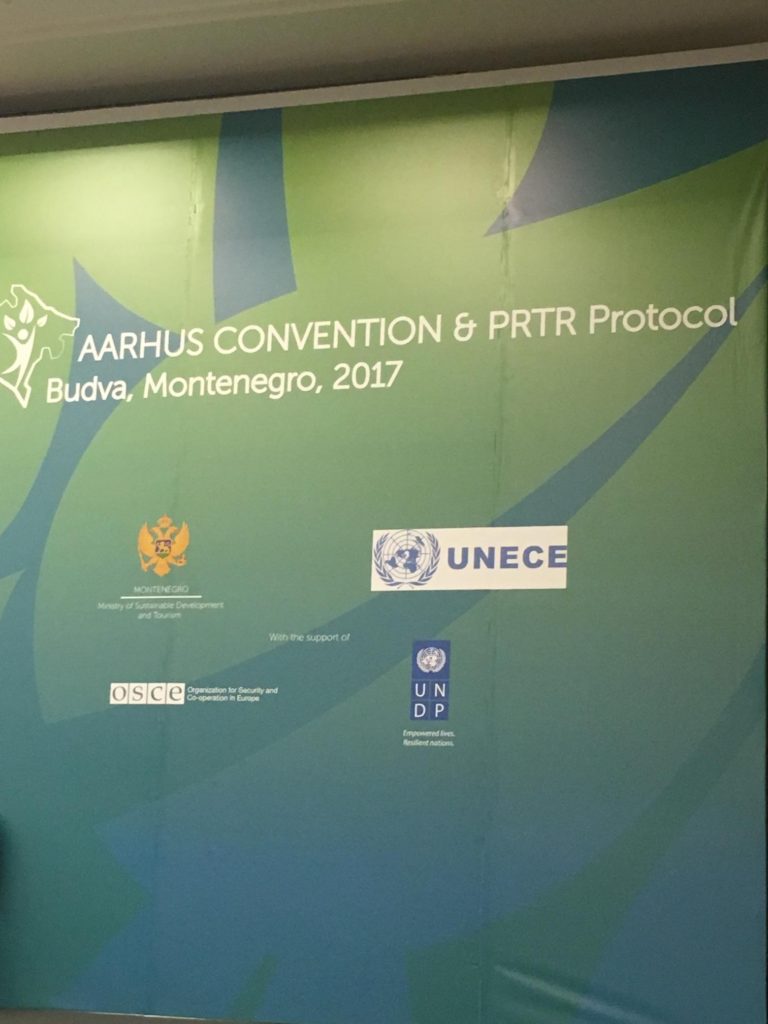Today, on September 14th, the high-level segment of the sixth session of the Meeting of the Parties to the Convention on Access to Information, Public Participation in Decision-Making and Access to Justice in Environmental Matters (Aarhus Convention) was held in the city of Budva (Montenegro). More than four hundred official delegates and NGO representatives from around fifty countries gathered in the meeting room to discuss impediments and achievements in the implementation of the convention and to agree on future steps for the further promotion and strengthening of the Aarhus principles. Environment-People-Law is represented at these international negotiations by the executive director Olena Kravchenko, as well as the head of the information-analytical department – Yelyzaveta Alekseyeva.

Traditionally, today the Meeting of the Parties, by its decisions, endorsed the conclusions and recommendations of the Compliance Committee with respect to the Parties found to be in the state of non-compliance. There are eleven of such for today: Armenia, Austria, Belarus, Bulgaria, Czech Republic, United Kingdom, European Union, Spain, Kazakhstan, Romania, Slovakia and Czech Republic.

EPL is infinitely proud and glad that Ukraine has finally come out of this list. In 2005 EPL brought a case to the Compliance Committee, which concluded that Ukraine had violated the Convention. It was further confirmed by the 2nd Meeting of the Parties the same year and later in 2008, 2011 and 2014. Ukraine was issued a caution, and threatened to be suspended of a special rights and privileges under the convention – one of the most severe international sanctions within the framework of the Aarhus regime.
It took Ukraine twelve years to properly develop the national legal framework for public participation in decision-making on environmental issues. On May 23, 2017, the Parliament of Ukraine adopted the Law of Ukraine “On Environmental Impact Assessment”. Earlier, the Compliance Committee analysed the text of the law and concluded that its provisions fully meet all of the recommendations of the decisions on Ukraine.
The Law of Ukraine “On Environmental Impact Assessment” introduced a modern progressive and effective procedure for assessing environmental impacts (hereinafter – EIA) to replace the soviet mechanism of a state ecological expertiza, which in recent years has been largely associated with corruption. The main idea of the EIA is that in the process of making a decision on the approval of a certain activity that may have a negative impact on the environment, the responsible authority receives full information about such an impact and has the opportunity to take into account environmental considerations, along with economic and social, and therefore make an informed, balanced and responsible decision. One of the main sources of such information is a public discussion during which members of the public have the opportunity to submit any comments and proposals to the planned activities. This system, firstly, obliges state agencies to assess the environmental impacts, along with the economic and social benefits of project implementation, and secondly, focuses on the prevention (avoidance, reduction or compensation) of negative environmental impacts, still at the stage of project review by a permitting authority.
The decision of the Meeting of the Parties on general issues of compliance adopted today (ECE/ MP.PP/2017/19) in paragraph 15 welcomed the committed action of Ukraine to fully address the recommendations made by the Meeting of the Parties in decisions on Ukraine to bring their legislation and practice into compliance with the Convention.
Yet, these are not the only good news for Ukraine. Representatives of Ukraine also found a wide support and were elected by the Meeting of the Parties to the convention bodies. Attorney and the chairman of the NGO “Bureau of Environmental Investigations” – Dmitry Skrylnikov – was elected to the Aarhus Convention Compliance Committee. Marina Shymkus – Head of the Department of European Integration of the Department of Strategy and European Integration of the Ministry of Environmental Protection of Ukraine – to the Bureau of the Aarhus Convention.
The only dark spot against the bright Montenegrin accomplishments of Ukraine was the reminder of the Compliance Committee that the Government of Ukraine has overdue the submission of its response to EPL’s allegations in the second case against Ukraine (in relation to production sharing agreements) filed in 2014. We hope the reminder will be taken seriously and the case considered in its the due course.
We are confident that this is only the beginning of the Aarhus victories of our state. Ahead is the adoption of the Law “On Strategic Environmental Assessment”, the development of implementing legislation, the introduction of environmental assessment mechanisms into national practice, and much more. EPL continues to be willing to assist the government in fulfilling these tasks.

